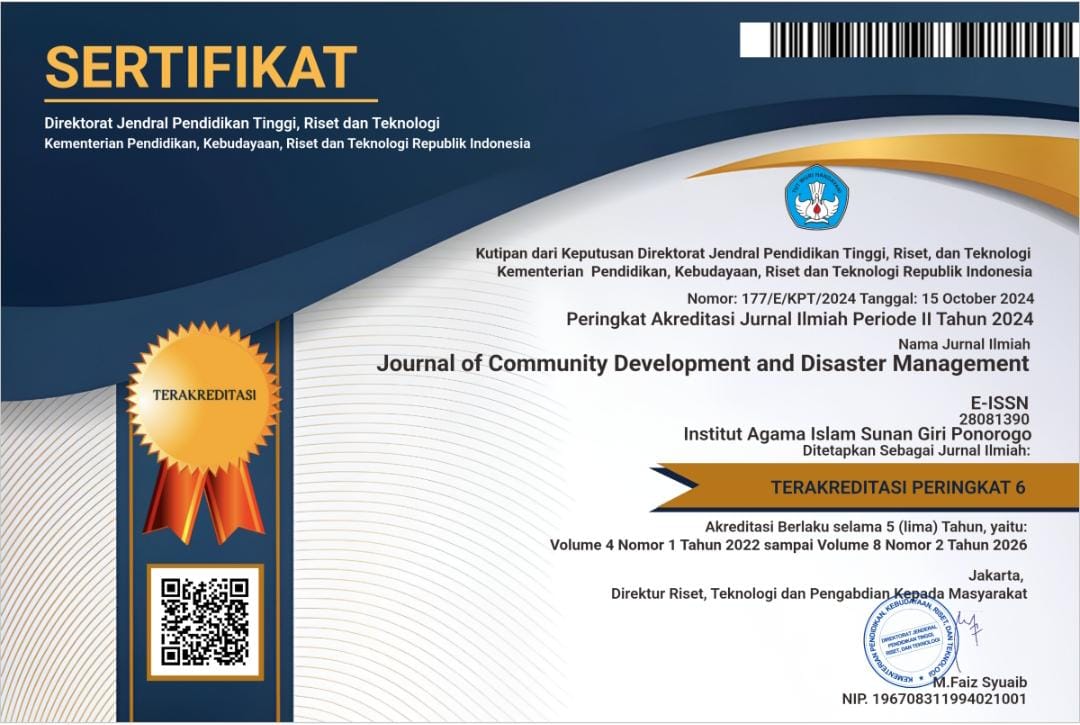Gender As A Moderator Of The Effect Of Attitude Toward Entrepreneurship, Perceived Behavioural Control On Entrepreneurial Intention
DOI:
https://doi.org/10.37680/jcd.v7i1.6955Keywords:
Attitude Toward Entrepreneurship, Entrepreneurial Intention, Gender Relationship, Perceived Behavioural ControlAbstract
This study aims to explore the role of gender on the relationship between attitude toward entrepeneurship, perceived behavioural control and entrepreneurial intention in vocational students in Indonesia. The data were gathered from several universities, comprising 600 students. Multigroup structural equation modeling was used to estimate the moderating effect of gender on the relationship. The result found that gender had weak effect on entrepeneurial intention, when it was treated as an independent variable, mediated by attitude toward entrepenurship and perceived behavioural control. However, the result indicates a significant effect of gender when it was treated as moderator. The significant moderating effects were found in the relationship between choice intention, self-efficacy and commitment, and between instrumental attitude and nascent entrepeneurship, as well as commitment and nascent entrepeneurship.
References
Badan Pusat Statistik. (2020), Berita Resmi Statistik (Keadaan Ketenagakerjaan Indonesia Agustus 2020), Badan Pusat Statistik, Jakarta.
Arbuckle, L.J. (2015), IBM SPSS AMOS 24 User's Guide, Amos Development corporation.
Camelo-Ordaz, C., Diánez-González, J.P. and Ruiz-Navarro, J. (2016), "The influence of gender on entrepreneurial intention: The mediating role of perceptual factors", BRQ Business Research Quarterly, Vol. 19 No. 4, pp. 261–277.
Haus, I., Steinmetz, H., Isidor, R. and Kabst, R. (2013), "Gender effects on entrepreneurial intention: a meta‐analytical structural equation model", International Journal of Gender and Entrepreneurship, Vol. 5 No. 2, pp. 130–156.
Hutasuhut, S. (2018), "The Roles of Entrepreneurship Knowledge, Self-Efficacy, Family, Education, and Gender on Entrepreneurial Intention", Dinamika Pendidikan, Vol. 13 No. 1, pp. 90–105.
Koellinger, P., Minniti, M. and Schade, C. (2013), "Gender Differences in Entrepreneurial Propensity*", Oxford Bulletin of Economics and Statistics, Vol. 75 No. 2, pp. 213–234.
Kolvereid, L. (1996), "Prediction of Employment Status Choice Intentions", Entrepreneurship Theory and Practice, Vol. 21 No. 1, pp. 47–58.
Kurjono, K., Yuliyanti, L. and Saripudin, S. (2020), “Entrepreneurial Intention Model of Learning and Self-Efficacy Aspects”, Dinamika Pendidikan, Vol. 15 No. 2, pp. 122–135.
Maes, J., Leroy, H. and Sels, L. (2014), "Gender differences in entrepreneurial intentions: A TPB multigroup analysis at factor and indicator level", European Management Journal, Vol. 32 No. 5, pp. 784–794.
Setyawan, A. (2016), “Apakah Gender Bermakna Pada Model Pembentukan Minat Berwirausaha?”, Jurnal Manajemen Teori Dan Terapan| Journal of Theory and Applied Management, Vol. 9 No. 2, available at:https://doi.org/10.20473/jmtt.v9i2.3017.
Schlaegel, C. and Koenig, M. (2014), "Determinants of Entrepreneurial Intent: A Meta-Analytic Test and Integration of Competing Models", Entrepreneurship Theory and Practice, Vol. 38 No. 2, pp. 291–332.
Shneor, R. and Jenssen, J. (2014), "Gender and Entrepreneurial Intentions", pp. 15–67.
Shinnar, R.S., Giacomin, O. and Janssen, F. (2012), "Entrepreneurial Perceptions and Intentions: The Role of Gender and Culture", Entrepreneurship Theory and Practice, Vol. 36 No. 3, pp. 465–493.
Shirokova, G., Osiyevskyy, O. and Bogatyreva, K. (2016), "Exploring the intention–behavior link in student entrepreneurship: Moderating effects of individual and environmental characteristics", European Management Journal, Vol. 34 No. 4, pp. 386–399.
Tempo. (2017), “Survei: Wanita Lebih Berani Jadi Pengusaha Dibanding Pria”, available at: https://bisnis.tempo.co/read/844576/survei-wanita-lebih-berani-jadi-pengusaha-dibanding-pria (accessed 30 March 2021).
Vamvaka, V., Stoforos, C., Palaskas, T. and Botsaris, C. (2020), "Attitude toward entrepreneurship, perceived behavioral control, and entrepreneurial intention: dimensionality, structural relationships, and gender differences", Journal of Innovation and Entrepreneurship, Vol. 9 No. 1, p. 5.
Downloads
Published
How to Cite
Issue
Section
License
JCD: Journal of Community Development and Disaster Management rekomendasi pencipta untuk memegang hak cipta tanpa batasan dan batasan pencipta untuk memiliki hak publikasi tanpa batasan, juga pemilik hak komersial atas artikel tersebut adalah pencipta.










